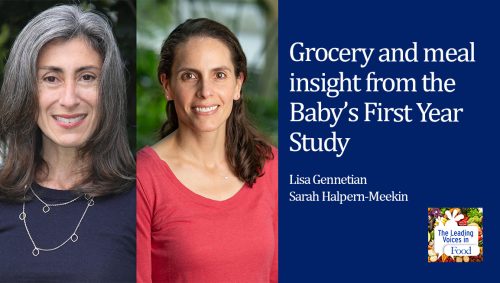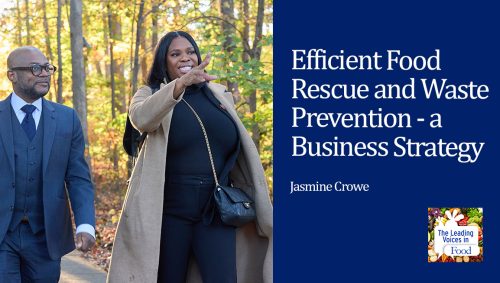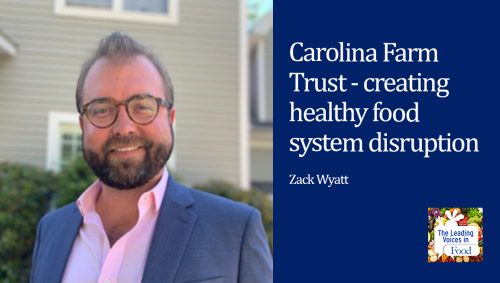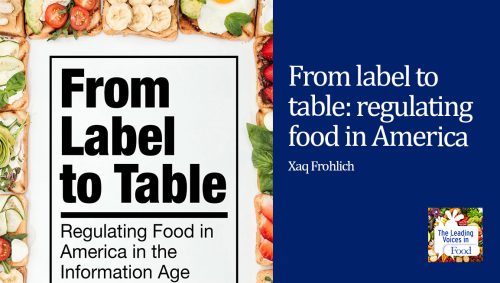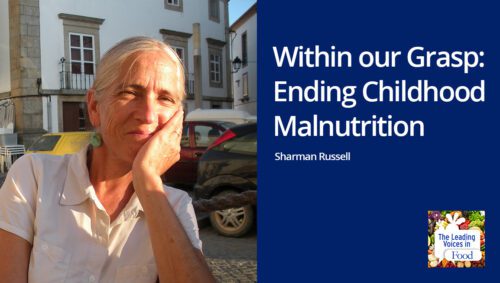The Leading Voices in Food
E95: COVID-19 Disruptions to Nutrition for Mothers and Children Could Cost the World a Generation
This podcast is part of a series focused on the far-reaching impact of the COVID-19 pandemic on the food system. Today, we’re looking at how the pandemic is driving up numbers, children experiencing or at risk for malnutrition, for wasting, and for possible death. Our guest expert is Dr. Saskia Osendarp, Executive Director of The Micronutrient Forum in Washington, DC.

Saskia Osendarp is the Executive Director of the Micronutrient Forum, an international expert organization and knowledge hub on micronutrient malnutrition, based in Washington DC. She has more than 25 years of experience in international nutrition research, in the public and private sectors and is a visiting associate professor Nutrition and Health at Wageningen University in the Netherlands. Dr. Osendarp is the founder and former co-chair of the Netherlands Working Group on International Nutrition (NWGN), a multisectoral working group to promote the inclusion of nutrition-specific and nutrition-sensitive approaches in evidence-informed policies. Recently, she has been a co-founder of the Standing Together for Nutrition Consortium, a collaboration of experts working in nutrition, food systems, health and economics analyzing the impact and responses of the COVID19 crisis on malnutrition.
Interview Summary
So Saskia, you and your research team recently published an article in the journal, Lancet where you presented deeply troubling data on child malnutrition, wasting, and potential death, as an impact of the pandemic. First, can you explain to our listeners how COVID-19 directly contributes to child malnutrition and child deaths around the world?
The way COVID-19 impacts child malnutrition is so unique and complex. We are actually facing a triple threat for malnutrition. COVID is putting an extra burden on the health system. In many countries, health system interventions have been stopped or been disrupted. So essential nutrition services that were normally being delivered through the health system—and this includes multiple micronutrient supplementation during pregnancy through antenatal care, vitamin A supplementation to children under the age of five, and the prevention and the treatment of acute malnutrition. We also have a crisis in the food systems that has caused food prices to go up and reduced availability of particularly nutritious foods on the markets. Then, we have an economic crisis on top of all that which has caused incomes to fall. So all of this had had severe implications for the quality of the diet that children can consume, and for the delivery of essential nutrition services.
Okay, let’s, let’s talk numbers. Can you describe the forecasted impact of COVID-19 on child malnutrition and child deaths?
Yes. Before this crisis, we had 48 million children that were wasted. We have projected that an additional 6.7 million children under the age of five would become wasted this year alone. So that is in 2020. And that’s an increase of 14%. That is an increase we really haven’t seen during for decades. In addition to that, wasted or acute malnutrition, (that is low weight for height), is an important cause of child deaths in the world. We also see an increase in child deaths under the age of five of an estimated 130,000 in 2020 alone. That would mean 10,000 children per month in this year alone, who would die due to COVID-related increases in wasting and disruption of delivery of these essential nutrition services.
I imagine, most of our listeners are familiar with the term wasted. But when you say a child is wasted, what exactly do you mean?
With wasted we mean that the child is too light for its height. It is a low weight for height. This is an acute form of malnutrition because when this is quite severe, it is actually immediately life threatening and these children need to be treated. It can also be moderate, and then, children can suffer longer-term consequences. I think that’s also the reason why we are so concerned about this increase because we know it is just the tip of the iceberg. First of all, this crisis will last longer. We will see other forms of child malnutrition increase, and we are currently projecting what this means for the immediate years to come.
So to give you an example, when mothers who are pregnant now suffer the impacts of the COVID crisis on their nutritional status, they will deliver babies that are born low birth weight. Those children then are themselves at higher risk of developing stunting in the next coming two years. But we also will see an increase in micronutrients deficiencies, micronutrient malnutrition. All of this will have impact for children in the future, and for the next generations, as well. When children are malnourished early in life, this affects their cognitive development. It will affect their school performance, and eventually, their future productivity as an adult. It will also affect their nutritional status, and their disease risk as an adult. Eventually, when these children who are malnourished now turn into women, they have a higher risk of delivering children with low birth weight again. That’s why the next generations are at stake, as well.
And is the increased child mortality, primarily, from the children being too weak to fight off diseases they may have been exposed to anyway? Or are there new things that come into the picture?
Almost half of all child deaths are due to child and maternal undernutrition. We knew that already before COVID. So with an increase in child malnutrition, we can, to some extent, also expect this increase in children’s deaths. We also now see a disruption of essential nutrition and health services that are affecting child mortality. In many countries, vaccination programs have been suspended. Growth monitoring and promotion programs and essential services, such as, vitamin A supplementation are directly, also related to a child’s mortality have been suspended. As well as, of course, the promotion of breastfeeding practices. All of this impacts the child’s nutritional status, and also its ability to fight off infectious diseases. And in many of the low-income countries, these are the common infectious diseases, which is diarrhea, measles, that are the biggest killers among these children.
Thank you. Those are, those are several of the best explanations I’ve heard of a definition of wasting, and that also, what puts a child at risk for mortality and morbidity. So thank you for that. So Saskia, you’re a champion of nutrition-specific and nutrition-sensitive approaches to evidence-informed policy. So let me ask you this. Knowing what we now know about the impact of the pandemic on child nutrition and development, how can we overcome this crisis, and build back even better?
Yes. So I think, as you rightly say, we need combination of nutrition-specific and nutrition-sensitive interventions now. And we always knew that we needed that, but particularly now, with this crisis being not just a crisis of the health systems, but also of the food systems and an economic crisis, we really need countries to step up efforts. And that has been summarized in a call to action that was published along with our paper by the four directors of the UN, of UNICEF, the WFP, WHO, and FAO.
First, you know, we need to make sure that families and children can keep access to safe and affordable diets. And that, at the moment, is at risk. But, for instance, we need to at least make sure that nutritious foods remain available on local markets. And that the supply chains are not being disrupted despite maybe, local lockdowns to mitigate the spread of the virus. That’s one.
Second, we need to make sure that all these essential services that are being delivered through antenatal care, or through child growth monitoring programs will need to be continued, and even scaled-up or intensified, while at the same time, of course, ensuring that health workers can deliver these services in a safe way. So they need to have adequate protection themselves.
Third, we need to ensure that we continue the detection and the treatment of child wasting. So the children that become acutely malnourished, they need to be treated. The provision of school feeding needs to continue. In many countries, obviously, schools were closed during lockdowns, and that meant that children are derived from these essential, additional meals. And if schools remain closed, we should look for innovative ways to deliver these additional meals to children.
And then lastly, but not least importantly, is that we need to step up social protection efforts, and make sure that they include nutrition. So, for instance, that they include cash transfers or vouchers that families can use to buy nutritional foods on the markets.
With what you just said, you reminded me of several things that you’d mentioned earlier. One was that this is a complex problem. And second, that there are a large number of international agencies and organizations involved in addressing this. So is it possible to reach consensus on what should be done? I mean, is there agreement across the international landscape about how we should be approached?
Yes, and that’s actually what we have achieved. You’ll see that across the board that this crisis has also resulted in unique forms of collaboration that didn’t really happen before. And we see the same here in nutrition, I think, where for the first time, actually, food systems, health systems, economists, and nutrition experts have really come together, and have said, “We really need to, first of all, identify what this crisis means for malnutrition in all its forms, and for the next few years.” And second, to speak with one voice on what we think needs to happen now, in order to, as you say, mitigate these impacts for the longer term when we need to build back better. We really need to invest in sustainable and resilient solutions to make food systems more resilient for these type of shocks in future, to make sure that health systems are not going to be disrupted to the extent we have seen in this crisis. And having said that, mind you, that there’s many, many countries out there now that are really making enormous effort of restoring some of these services, but I think we have to make sure that this doesn’t happen again. And this type of unique collaborations really should continue even when this pandemic is over, because that’s the only way we can tackle such a complex issue. So in that regard, COVID has accelerated this type of innovative collaborations.
So what are the implications now, and also in the future, if we don’t act?
Yeah, so the implications are, if we don’t act, that we really lose an entire generation. And that sounds very dramatic, but I think that most of us who have worked in nutrition for decades have never really seen such a rapid projected deterioration. I think if we don’t act now, we run a risk that we lose the progress that we’ve made in the last two decades. And for these generations of children that, that are being born now, there’s no time to waste because we also know, as I just explained, that the nutrition in the first 1000 days, so basically, during pregnancy and the first two years of life, is determining the future of these children that will eventually determine the GDP of countries. We know now that malnutrition can cost several percent points of a country’s GDP per year. These children, in the future, will have a higher risk of having chronic diseases and obesity in life. So it is really a generation’s social capital that is at stake here.

